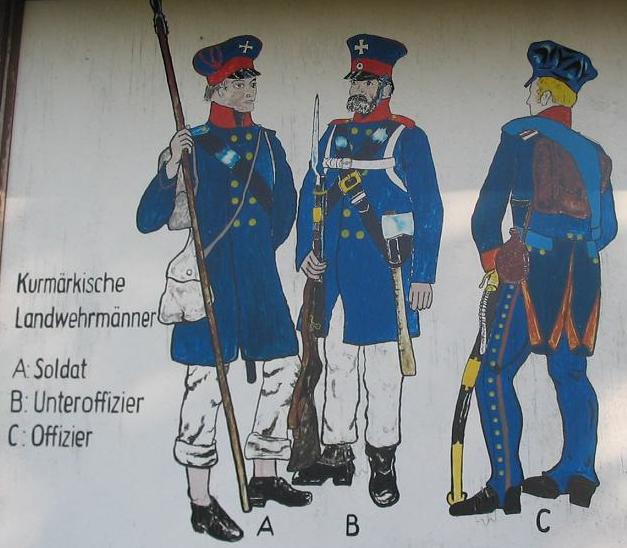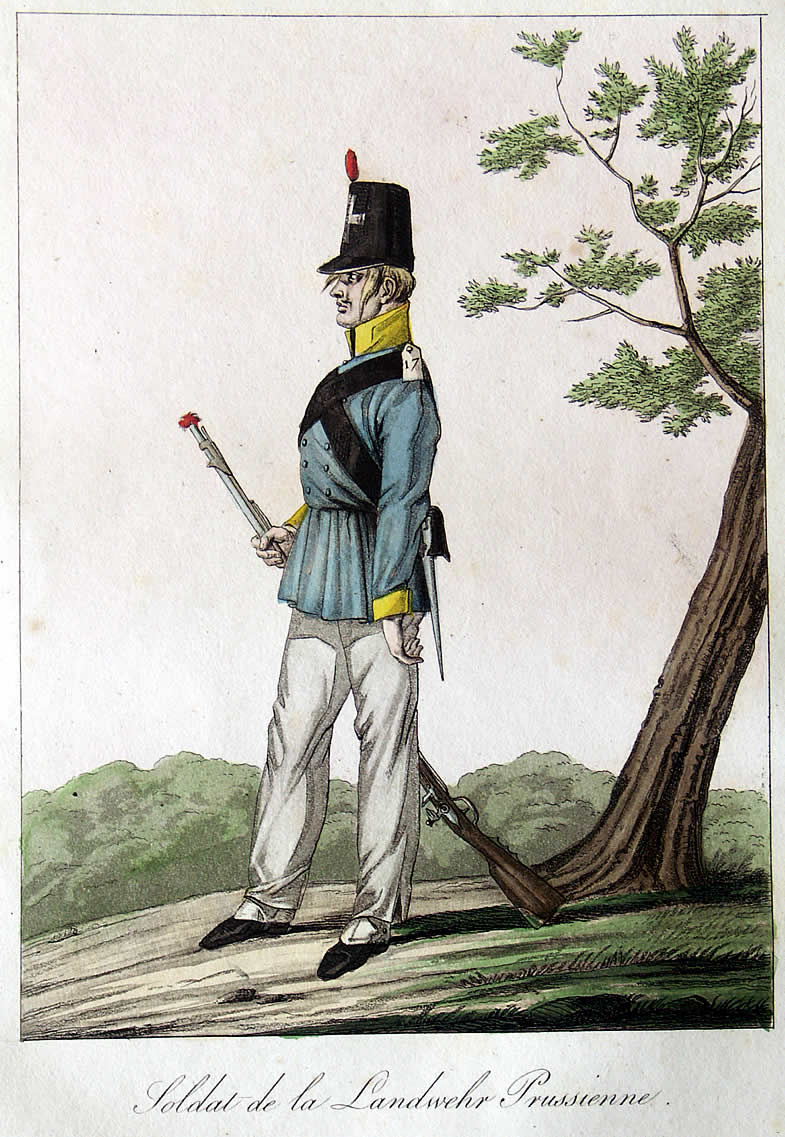Landwehr Divisions Of Germany In World War I on:
[Wikipedia]
[Google]
[Amazon]
 ''Landwehr'', or ''Landeswehr'', is a
''Landwehr'', or ''Landeswehr'', is a
 The landwehr in Prussia was first formed by a royal edict of 17 March 1813, which called up all men capable of bearing arms between the ages of eighteen and forty-five, and not serving in the regular army, for the defense of the country. After the peace of 1815 this force was made an integral part of the
The landwehr in Prussia was first formed by a royal edict of 17 March 1813, which called up all men capable of bearing arms between the ages of eighteen and forty-five, and not serving in the regular army, for the defense of the country. After the peace of 1815 this force was made an integral part of the
 The
The
German language
German ( ) is a West Germanic languages, West Germanic language mainly spoken in Central Europe. It is the most widely spoken and Official language, official or co-official language in Germany, Austria, Switzerland, Liechtenstein, and the Ita ...
term used in referring to certain national armies, or militias found in nineteenth- and early twentieth-century Europe. In different context it refers to large-scale, low-strength fortifications. In German, the word means "defence of the country"; but the term as applied to an insurrectional militia is very ancient, and ''lantveri'' are mentioned in '' Baluzii Capitularia'', as quoted in Hallam's ''Middle Ages'', i. 262, 10th edition.
The English term " home guard" may possibly derive from an attempt to translate the term ''landwehr'', the earliest unit calling itself "home guard" being formed by German immigrants in Missouri in the events leading up to the American Civil War.
Austria-Hungary
Austrian ''Landwehr''
The Austrian Landwehr was one of three components that made up the ground forces of the Austro-Hungarian Dual Monarchy between 1868 and 1918, and it was composed of recruits from theCisleithania
Cisleithania, also ''Zisleithanien'' sl, Cislajtanija hu, Ciszlajtánia cs, Předlitavsko sk, Predlitavsko pl, Przedlitawia sh-Cyrl-Latn, Цислајтанија, Cislajtanija ro, Cisleithania uk, Цислейтанія, Tsysleitaniia it, Cislei ...
n parts of the empire. Intended as a national defence force alongside the Royal Hungarian Landwehr (or Hungarian Honved Hungarian may refer to:
* Hungary, a country in Central Europe
* Kingdom of Hungary, state of Hungary, existing between 1000 and 1946
* Hungarians, ethnic groups in Hungary
* Hungarian algorithm, a polynomial time algorithm for solving the assig ...
), the ''Landwehr'' was officially established by order of Emperor Franz Josef
Franz Joseph I or Francis Joseph I (german: Franz Joseph Karl, hu, Ferenc József Károly, 18 August 1830 – 21 November 1916) was Emperor of Austria, King of Hungary, and the other states of the Habsburg monarchy from 2 December 1848 until his ...
on 5 December 1868. Yet while the Hungarian force was generously supported early on by the parliament in Budapest, legislators in Vienna generally failed to advance the cause of the ''Landwehr'', leaving it by the 1870s as a skeletal force with only the appearance of parity. In 1887, Archduke Albert wrote that ''Landwehr'' units were not ready, in terms of training or discipline, for use in the first two weeks of a war. Yet the 1880s saw an expansion in the force's numbers, as the high command was unable to obtain increases in manpower for the joint Imperial and Royal
The phrase Imperial and Royal (German: ''kaiserlich und königlich'', ), typically abbreviated as ''k. u. k.'', ''k. und k.'', ''k. & k.'' in German (the "und" is always spoken unabbreviated), ''cs. és k. (császári és királyi)'' in Hungari ...
army and sought to increase overall numbers through the ''Landwehr''. Additionally, Austrian fears of the development of the Honved caused the Austrian '' Reichsrat'' to vote to increase the ''Landwehr's'' strength to 135,000. These nationalist interests led to a gradual strengthening and improvement of the force, so that by the start of the First World War, ''Landwehr'' units were considered equal to the units of the joint army in readiness and equipment. Additionally, in Tyrol and Carinthia
Carinthia (german: Kärnten ; sl, Koroška ) is the southernmost States of Austria, Austrian state, in the Eastern Alps, and is noted for its mountains and lakes. The main language is German language, German. Its regional dialects belong to t ...
, three units of the ''Landwehr'' were specially trained and equipped for mountain warfare.
The Austrian Landwehr and the other components of the Austro-Hungarian Army were all full-time standing armies
A standing army is a permanent, often professional, army. It is composed of full-time soldiers who may be either career soldiers or conscripts. It differs from army reserves, who are enrolled for the long term, but activated only during wars or na ...
.
Hungarian Landwehr
The Royal Hungarian Landwehr (german: königlich ungarische Landwehr, hu, Magyar Királyi Honvédség, colloquially called the ''Honvéd'') or Royal Hungarian Honved, was the standing army of the Kingdom of Hungary, established as one of four armed forces (''Bewaffnete Macht'' or ''Wehrmacht'') of Austria-Hungary from 1867 to 1918. The others were its counterpart the Austrian Landwehr, the Common Army and the Imperial and Royal Navy. In the wake of fighting between the Austrian Empire and the Hungarian rebels during the Hungarian Revolution of 1848, and the two decades of uneasy co-existence following, Hungarian soldiers served either in mixed units or were stationed away from Hungarian areas. With theAustro-Hungarian Compromise of 1867
The Austro-Hungarian Compromise of 1867 (german: Ausgleich, hu, Kiegyezés) established the dual monarchy of Austria-Hungary. The Compromise only partially re-established the former pre-1848 sovereignty and status of the Kingdom of Hungary ...
the new tripartite army was brought into being. It existed until the dissolution of the Austro-Hungarian Empire following World War I in 1918.
The Hungarian ''Landwehr'' should not be confused with its successor, the Royal Hungarian Army, which went by the same Hungarian name, but existed from 1922 to 1945.
Prussia
 The landwehr in Prussia was first formed by a royal edict of 17 March 1813, which called up all men capable of bearing arms between the ages of eighteen and forty-five, and not serving in the regular army, for the defense of the country. After the peace of 1815 this force was made an integral part of the
The landwehr in Prussia was first formed by a royal edict of 17 March 1813, which called up all men capable of bearing arms between the ages of eighteen and forty-five, and not serving in the regular army, for the defense of the country. After the peace of 1815 this force was made an integral part of the Prussian Army
The Royal Prussian Army (1701–1919, german: Königlich Preußische Armee) served as the army of the Kingdom of Prussia. It became vital to the development of Brandenburg-Prussia as a European power.
The Prussian Army had its roots in the co ...
, each brigade being composed of one line and one ''Landwehr'' regiment. This, however, slowed the mobilisation of brigades as Landwehr regiments had to be called up, diminishing the value of the first line. By the re-organization of 1859 the ''Landwehr'' troops were relegated to the second line.
Nazi Germany
During the Weimar republic, Germany was not allowed a standing army of more than 100,000 men. Thus conscription had been abolished. In the course of the rearmament of Germany, the ''Landwehr'' was reestablished on 21 May 1935 comprising all Germans liable for military service under the new law older than 35 years of age and younger than 45 years. In effect only one Landwehr division (the 14th Landwehr Division) was called up, the remainder of the ''Landwehr'' was used either to fill out the 3rd wave infantry divisions or formed '' Landesschützen'' battalions used for guard and occupation duty.Switzerland
InSwitzerland
). Swiss law does not designate a ''capital'' as such, but the federal parliament and government are installed in Bern, while other federal institutions, such as the federal courts, are in other cities (Bellinzona, Lausanne, Luzern, Neuchâtel ...
, the ''Landwehr'' used to be a second line force, in which all citizens served for twelve years. It was abolished after the army reform in 1965. As a reference to this past, a number of Swiss wind bands bear the name "''Landwehr''" in their titles.
Baltic ''Landeswehr''
 The
The Baltic Landeswehr
The Baltic Landwehr or ("Baltic Territorial Army") was the name of the unified armed forces of Couronian and Livonian nobility from 7 December 1918 to 3 July 1919.
Command structure
The Landeswehr was subordinated to the German VI Reserve ...
was the name of the armed forces of the puppet Government of Latvia established by the Baltic nobility. The Baltic state was designed to be established from territories that were ceded by Imperial Russia
The Russian Empire was an empire and the final period of the List of Russian monarchs, Russian monarchy from 1721 to 1917, ruling across large parts of Eurasia. It succeeded the Tsardom of Russia following the Treaty of Nystad, which ended th ...
in the Treaty of Brest-Litovsk in 1918, but collapsed in the Estonian War of Independence in 1919.
See also
*Hrvatsko domobranstvo Hrvatsko may refer to:
* ''Hrvatsko'', an adjectival form of the Croatian words for Croatia, cf. "hrvatski"
* Hrvatsko, Primorje-Gorski Kotar County, a village near Delnice, Croatia
* Hrvatsko Selo
Hrvatsko Selo is a village in Croatian municip ...
(''Croatian Landwehr'')
* Slovensko domobranstvo
The Slovene Home Guard ( sl, Slovensko domobranstvo, SD; german: Slowenische Landeswehr) was a Slovene anti-Partisan military organization that was active during the 1943–1945 German occupation of the formerly Italian-occupied Province of Ljubl ...
(''Slovenian Landwehr'')
* Landsturm
* Volkssturm
* National Guard (disambiguation)
Footnotes
References
* * {{Authority control Austro-Hungarian Army Militias in Europe